
- by Peter Bazire
[Excerpts] ...
[...]
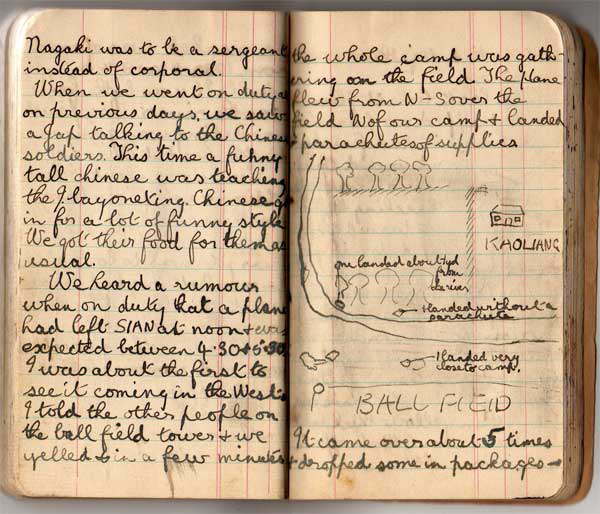
Wednesday, August 15th --
During the afternoon and evening rumours were going around camp that war had finished. In the evening, Mr. Mc Laren read out in front of the discipline office that the Japanese emperor had ordered that no more firing should be.
The Japs neither confirmed nor denied this statement.
Thursday, August 16th
Around midday rumours went around that war was over. There were crowds near the front gate all talking away.
Soon the crowd dispersed and the people discussed the end of the war and what they would do.
About 8:20 p.m. a car arrived at the front gate. People came from all directions to see who was in it. It turned out to be a couple Japs. It was about the first car we had seen for a long time.
Friday, August 17th
Everybody was exited and couldn’t settle down.
We, of course dug into our stores more than usual.
After morning roll-call, about 9:30 we heard a plane. Everybody rushed out and we found out that it was American. Occasionly foriegn (sic) planes had flown over but this was the first to fly low. It came from S-W. It flew E. of the camp and we could see the star. It had 4 engines and was a B-24.
We all waved and cheered although they told us after that they didn’t see us. It came over again and flew from S-N over the camp very low, about 40 feet. It almost touched the trees. Then it circled around and flew N-S, but what thrilled us all was that it dropped parachute troops. 7 in all.
Major Staiger
Lieut. J. Moore (Chefusian)
Lieut. Hannen
Sgt. Ray Hanchulack
Cpl. Tad Nagaki (naturalised Jap-American)
Cpl. Peter Orlick
Edward Wong. (Chinese)
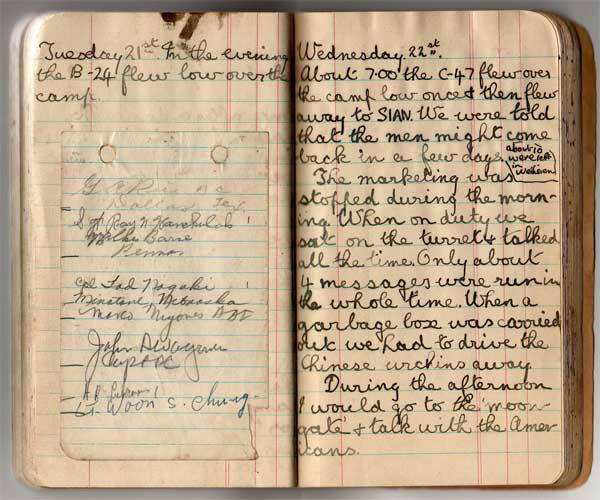
We all rushed out of camp to help them in. They dropped in dull white silk parachutes. All they had to do was to turn a thing and ... press it and they were released from the parachute.
They hid behind grave mounds because when they had started out, war hadn’t finished.
It was a mistake what we had heard on Thursday.
We yelled in English to them and they realised that they were safe then showed themselves.
I was one of the first to come across. E. Wong.
They had .45 colts by their hips and .32 up near their left shoulders.
We were half a mile from camp amongst kao-liang and millet.
The plane was 600 ft. up when they dropped. The plane zoomed over again and in its bomb racks it had big metal containers about 4’ high and over a foot wide slightly rounded at each end.
We carried them to a general dump by a grave
.
They were dropped with parachutes.
The plane came again and dropped a few more and after that circled once more and flew W very close to the kao-liang and went for ever that day. The plane also ... (?)
We then went in search for the supply containers. Some were’nt found for quite a time.
We had 4 men to a container and another carried the parachute. They brought out the reserve gang cart out and dumped a good deal of the stuff on that.
I thought the whole thing was over when Hoyte III asked me to come with him. A feeble minded police tried to stop us but we told him that we were doing good work so he let us go on. We carried a big basket affair which contained radio parts.
We ran all the way.
The band was playing and they had brought my trumpet. Since we children were not allowed out again I played in the band. The Chungking troops were outside our front gate when the P. troops landed to protect them and us.
The major was about the last to come of everybody, and was carried by a couple of men.
Everybody cheered ...
The Americans went to the Administration building in Moon Gate and talked with the big-shots of the camp.
E. Wong talked to us through the window.
He was in Peking 7 years ago but escaped from school and went to high school and then joined up. It was the first time he had jumped from an airplane.
He is called “Shorty” because of his height (about 5’)
When the soldiers came out children flocked towards them, especially Nagaki. He is always seen walking around with children.
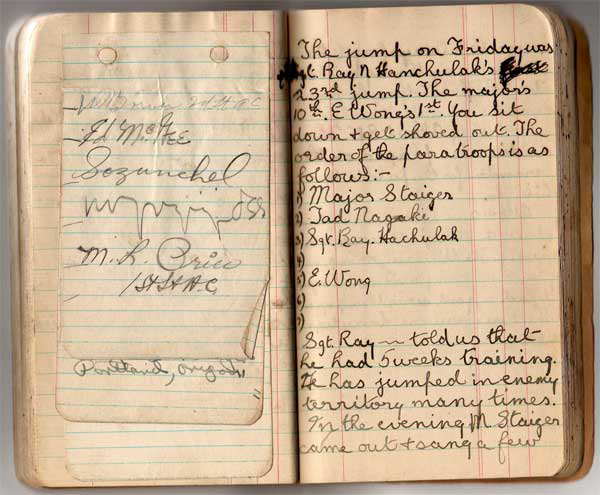
These parachute troops were picked men. When they landed they didn’t know, whether Japs or communists, who were numerous, would attack them for the war isn’t over yet. They were brave men. The Japs were feeling funked and couldn’t stop us so the Americans came in safe.
Some invalids were told to prepare 1 suit-case --- no more than 50 lbs. in case they would go that day.
They didn’t.
Saturday, August 18th,
People young and old were asking that Americans to write their names in their autograph albums or suchlike books.
I forgot to say that on Friday evening the sewing room made letters out of the parachute “O.K. TO LAND” for the air-drome which is about 5 miles South of us at (?) ...
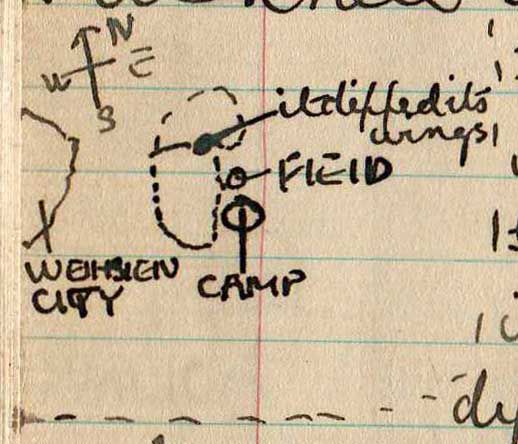
Also the U.V. and L.V. had to be messengers for the camp police who wore red armbands with C.P. in black. We wore green scarves on our left arms. First of all we did from 2-6 p.m.. There weren’t many messages to carry.
- Saturday (continued)
There were 3 messangers (sic) at H.Q. (S.W. room of 25) & 2 at the gate. The hours were permanent ― 9.30 to 11.30; 11.30 to 1.00; 1.00 to 3.00; 3.00 to 5.00 from then on. I was on from 1 to 3 at the gate. I was told in the morning that A. Hummel & Tipton were expected that day. I saw horses the other side of the river coming down the path. I guessed that they were T + H. . The horses’ tails were different colour from the main body.
A Chinese told us that they were.
When they came in sight again they were walking with a Chinese officer between them. Tipton was in canary khaki & Hummel in blue trousers & white shirt.
The camp came down to the front gate to see them especially D. Candlin who is H’s girl friend. They went to H.Q. & the Adm. Building & talked there.
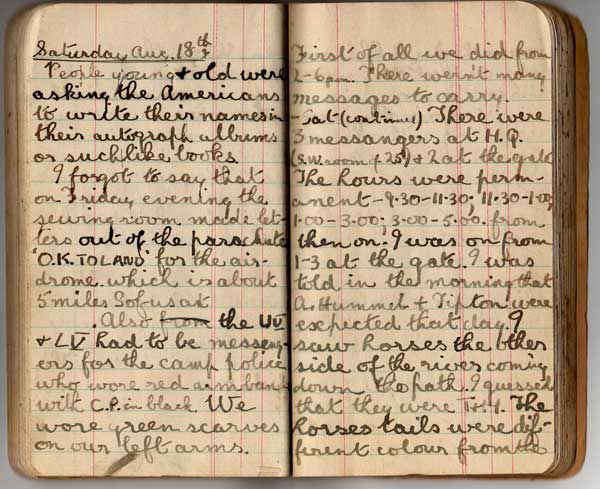
A wretched Jap plane was on the airfield so when the B-24 came that afternoon, it couldn’t land. As well the Japs had some men with rifles on the base. The major was very heated with the Japs.
[further reading] ...




http://www.weihsien-paintings.org/PeterBazire/diaryBook/Wednesday.htm
#








